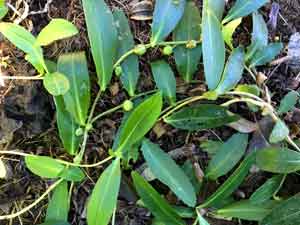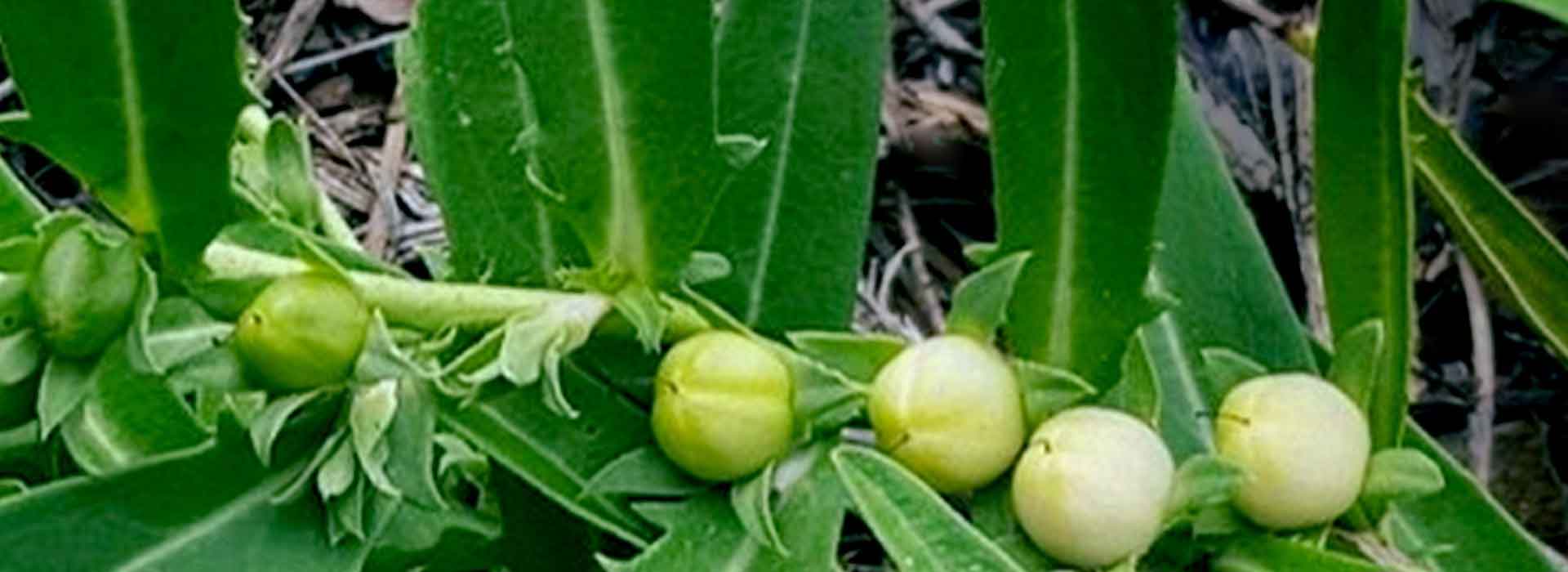Winter Apple
Winter Apple (Amulla) is an attractive drought-hardy native bushfood plant adapted to grow in a range of soil types, including nutrient-poor soils, making it ideally suitable for low maintenance and water-efficient gardens. Winter Apple {Eremophila debilis) is also commonly referred to as Winter Berry due to the size of the edible fruits it produces and being a low-lying creeping plant it increases biodiversity in the garden by providing wildlife habitat for small lizards. It grows in the coastal and inland areas of Queensland through to eastern New South Wales and can successfully be grown in other areas if protected from severe frosts. It can tolerate mild frosts.
Position
 Winter Apple is a low growing, trailing ground cover plant spreading to around 2 metres, with some forms being partially upright and reaching a height of up to 0.5 metres. It prefers a sunny position but will tolerate semi-shade if located in an area not prone to severe frosts. Roots form where the stems touch the soil, establishing a dense mat ideal for suppressing weeds. Winter Apple is also suitable for garden rockeries and makes an attractive feature plant.
Winter Apple is a low growing, trailing ground cover plant spreading to around 2 metres, with some forms being partially upright and reaching a height of up to 0.5 metres. It prefers a sunny position but will tolerate semi-shade if located in an area not prone to severe frosts. Roots form where the stems touch the soil, establishing a dense mat ideal for suppressing weeds. Winter Apple is also suitable for garden rockeries and makes an attractive feature plant.
Soil
The plant is commonly found growing in dry woodland areas and will grow in a variety of soil types providing they have reasonable drainage. They require minimal watering as they are quite drought tolerant. Eremophila from Greek, eremos, desert and phileo, to love, “desert loving” referring to arid habitats. Regular watering during the fruit development stage will result in sweeter tasting fruit.
Flowering and Fruiting
The flowers are five-petalled and 1cm in diameter, usually mauve in colour. White, white-pink and blue forms are also found. Blooms can appear sporadically throughout the year with spring and summer being the predominant flowering seasons. Small green fruits approximately 8mm in size appear in autumn/winter either turning white or pink when ripe. The fruit has an appearance of a tiny apple with a similar crispy texture and sweet taste.
Propagation
A naturally occurring growth inhibitor present in the hard woody seeds of the Winter Apple prevents germination, making it extremely difficult to grow. While a number of treatment methods have been explored, propagation from seed remains to be unreliable. Propagation from cuttings is very simple by taking hardened current season’s growth. For best results take cuttings in summer and they should successfully strike within 3 to 4 weeks.
Pests and Disease
Eremophila debilis has no known pests or diseases and is not considered to be at risk in the wild.
Pruning
The plant responds well to tip pruning, regularly pinching out growing shoots will encourage bushier growth and prevent it from becoming scraggly.
Uses
The fruits can be harvested and enjoyed as a garden snack but the size of the hard seed contained in the small fruit doesn’t leave much edible flesh, so they are not well suited for commercial scale food growing. Due to Winter Apple plants having the ability to cope with long dry periods they are an ideal choice for gardens where water supply is limited or restricted.
References
Australian National Botanic Gardens website: http://www.anbg.gov.au/gnp/gnp10/eremophila-debilis.html
https://www.gardensonline.com.au/gardenshed/plantfinder/show_3357.aspx
Stephens, K.M., Sharp, D. (2009) The Flora of North Stradbroke Island. Brisbane: Queensland Herbarium Environmental Protection Agency.
The Cow Bay Bushcare Group (2011) Native Plants of the Bay Islands, Volume II

